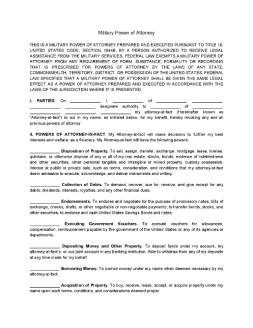- Eviction Notice Forms
- Power of Attorney Forms Forms
- Bill of Sale (Purchase Agreement) Forms
- Lease Agreement Forms
- Rental Application Forms
- Living Will Forms Forms
- Recommendation Letters Forms
- Resignation Letters Forms
- Release of Liability Agreement Forms
- Promissory Note Forms
- LLC Operating Agreement Forms
- Deed of Sale Forms
- Consent Form Forms
- Support Affidavit Forms
- Paternity Affidavit Forms
- Marital Affidavit Forms
- Financial Affidavit Forms
- Residential Affidavit Forms
- Affidavit of Identity Forms
- Affidavit of Title Forms
- Employment Affidavit Forms
- Affidavit of Loss Forms
- Gift Affidavit Forms
- Small Estate Affidavit Forms
- Service Affidavit Forms
- Heirship Affidavit Forms
- Survivorship Affidavit Forms
- Desistance Affidavit Forms
- Discrepancy Affidavit Forms
- Guardianship Affidavit Forms
- Undertaking Affidavit Forms
- General Affidavit Forms
- Affidavit of Death Forms
Military Power of Attorney Form
As of 2018, the total active military force in the United States adds up to 0.5% of the total population, according to a report by the Council of Foreign Relations. The 0.5% translates to roughly 2.2 million individuals who are actively part of the military force. The figures reported can also translate to the number of people who should have a military power of attorney form. A member of the military uses a Military Power of Attorney for dire situations that happen or when they are out of the country for quite a while. Know more about its composition and importance through this article. Read More
Military Power of Attorney Form
What Is a Military Power of Attorney Form?
Straightforwardly, the military power of attorney form is a document that an active member of the military force prepares and signs to assign someone certain authorities to handle legal or financial matters while they are away. It is a list of the matters that they are willingly assigning to someone, such as a close friend or family member. Moreover, each assigned case is defined by stating the extent of the designated authority. As this document is deemed necessary for all members of the military force, it is especially essential for those who are deployed.
How Do You Create a Military Power of Attorney Form?
A deployed member of the military force should have a copy of this document because they will not be in the country for significant periods, thus making them incapable of handling certain legal and financial matters. On the other hand, a close family member is not legally allowed to decide for their stead without a power of attorney. Plus, sudden financial situations that require the decision of the principal may not push through without a form. These reasons raise the significance of creating this power of attorney document. Here are some steps on how one can prepare a military power of attorney form.
1. Choose a Reliable Attorney-In-Fact
The first clause in the power of attorney document introduces the parties involved, which are the principal and the agent. The agent is the principal’s chosen attorney-in-fact. It is also the principal’s responsibility to choose a reliable agent. That is why most principals select their spouse, siblings, or close friends. Others want to assign it to their lawyer. Once it is final, both the principal and chosen attorney-in-fact will be bound by the legal document.
2. Determine the Extent of the Power
After pointing out the parties involved, the next part of the document determines the matters that the principal will assign to the agent. It is a list of the powers of the agent. The statements should define as to what the agent can do with it, granted the authority by the principal. The list consists of either legal and financial matters that the principal cannot settle due to their absence because of their military duty. The only thing that the principal needs to do is to read the description of each statement thoroughly and affix their initials if they are willing to authorize the agent to manage it.
3. Specify the Termination Terms
The list containing the powers of the attorney comprises a significant part of the document. The clause after it determines the termination of the clause. This part is highly essential because of the nature of the profession of the principal. Similar to other power of attorney documents, only the principal can terminate the effectiveness of the document. However, a follow-up clause regarding the termination makes it different from others. The difference lies in the possible situations that the principal may face during the deployment. Thus, both parties must be well-aware of this subsequent clause.
4. Gather the Agent’s Acknowledgement
As a legal document that binds two parties, the other party must fully accept the responsibility assigned by the principal’s party. A verbal agreement does not hold the same power with a signed agreement. Therefore, the signature represents the agent’s acceptance in the main document and in the acknowledgment statement that follows the primary contract. Once the agent signs the paper, the other party can assume that the agent read the entire document and understood the role that they will be filling in.
5. Notarization and Witness Signatures
The witness acknowledgment statement follows the agent’s acknowledgment statement. Usually, two witnesses are required to prove the legitimacy of the entire transaction. The witnesses’ primary role is to oversee the transaction and to prove that there was no incident of coercion or any similar event that may affect the decision making of either party. The last part requires the notarization of the document. Similar to the bill of sale documents that need notarization, both parties must stand witness before the notary public before signing the document.
FAQs
Can you put a limit on the military power of attorney?
Yes, you can choose to limit the effectiveness of the document to one year when the form is drafted as a special power of attorney. The limit of a special power of attorney is one year.
How do you cancel a military power of attorney?
To cancel a power of attorney, the principal must write a formal letter of revocation and create a new one. The new document, however, must assign a new agent. The principal should also take on the responsibility of informing the affected third parties.
Can I reverse the effect of the document?
The principal can reverse the effects of the document as long as he proves the he made this decision with a sound mind. A power of attorney revocation form is necessary to jumpstart this process.
Does a military power of attorney expire?
The document expires on the date specified on the document. But, as stated above, the thing that sets a military POA apart from other forms is that it can expire when the principal dies, goes missing, or engages in other situations that make them incapable of revoking or making further decisions regarding the matters stated in the document.
What are the benefits of having a power of attorney?
The main benefit of having a power of attorney is the convenience that it brings because it is a form of initial planning. Having this document means that you have looked into possible scenarios in the future that may impede your decision-making capacities, thus being incapable of making decisions regarding important financial and legal matters.
Being a part of the military force is a choice that most people see as brave and honorable. As a member, you may have similar thoughts, but it is still essential to look after yourself and the assets you have collected from the years of service. Thus, the military power of attorney is necessary. It lets your most trusted people care for your assets in the same way that you would. In a profession that faces countless uncertainties, it is highly critical to have a power of attorney beforehand to secure certainty in your legal matters and financial assets.

